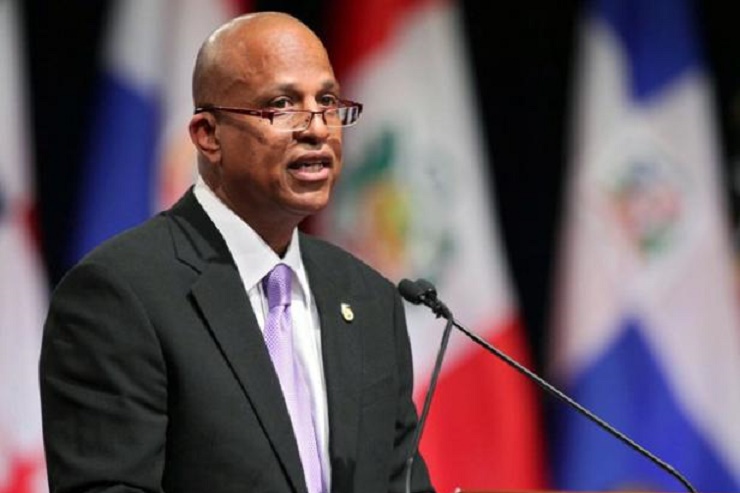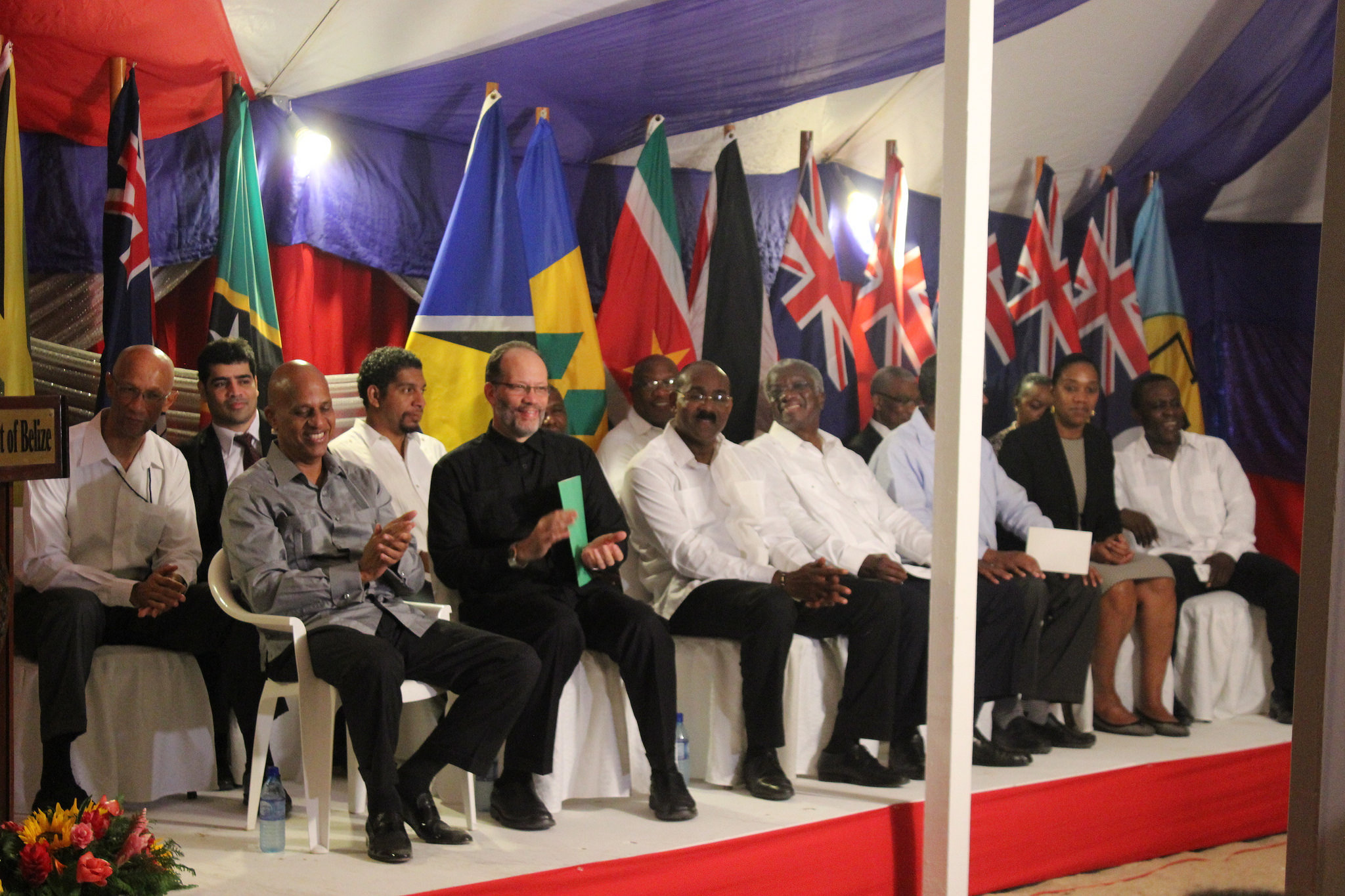Distinguished guests
I am especially pleased to be here on my first visit to Belize, and to be able to savour the charming manner and warm hospitality of the government and people of this great country, often described as the potential bread basket of the Caribbean.
When last we gathered together, in Conference, I had the honour to host you in Barbados in July, 2015 for our 36th Regular Session. I have, since then, had the honour of presiding over the Caribbean Community as its Chairman, through a remarkably busy period for the world and for our Community between July 01, and December 31st, 2015. The last time that Barbados performed this role was some 8 years ago, in 2007.
I have taken the liberty of putting at your disposal in writing a brief note outlining some of the key developments of that period – a modest attempt at something like a Chairman’s report. I will not therefore detail to you here all that has been done during my incumbency, as that report will be circulated.
In so doing, I hasten to give you this undertaking. In preparing this brief report, I have been careful to heed Winston Churchill’s famous description of an unwelcome reportwhich he said “by its very length, it defends itself against the risk of being read.” I hope that my report, at least by virtue of being brief, will steer clear of that risk.
I should like, however, to take this opportunity briefly to share with you a few reflections in connection with the period July-December, 2015.
I have frequently stated my deep conviction that our decision-making must be orderly and rigorous. Only in this way can we deliver to our peoples the regional public goods they expect as the fruits of our deliberations. In this context, I was especially satisfied that at our last meeting we adopted some clear rules about how the Conference takes and implements its decisions.
To add to this welcome development, I am pleased to note that we will be considering, during this present session, the formal draft rules of procedure for our Conference which we hope to adopt in July. I understand that this may have the outward appearance of a minor piece of procedural pettifogging. But the rigour of our decision-making is directly linked to the quality of implementation, and of course, our decision-making must at all times be able to withstand the scrutiny of institutions like the Caribbean Court of Justice, that of the people of the region, and indeed, of the world.
In a remarkable rendezvous with history, the Community played a vital role in the preparation, conduct and outcomes of the landmark 21st Conference of the Parties of the United Nations Framework Convention on Climate Change, the COP 21, which took place in Paris in November and December of last year. A long period of dedicated technical preparation at the regional level preceded the Conference. Many of us were then present in Paris to provide political guidance and support to our negotiators and,with untiring resolve, to give leadership to the pursuit of our identified goals.
No agreement involving in excess of 190 countries can possibly satisfy all. On balance, we however,in CARICOM were able to get the major breakthroughs that we wanted. I am of the view that, the agreement, implemented with seriousness and determination by the international community, will allow us to address the multi-faceted challenges which climate change poses for our countries.
Mr Chairman,
I have underlined the importance of coherent and structured decision-making and organisation, in reference to a signal matter in respect of which, as a region, we took several important decisions and then implemented them over the last six months.
I should like to highlight another one of the essential principles that must permeate what we think, what we say, and what we do as a region. I speak of the need for an unshakeable commitment to unity in the face of adversity. A mere two months after our last meeting, the Commonwealth of Dominica was made to experience the wrath of Hurricane Erika with tragic and disruptive consequences. Visiting the country with our Secretary-General, I saw for myself, a few days after Erika struck, the extent of the damage that was done.
I witnessed also the courageous and unyielding determination of the government and people of Dominica to begin and sustain the process of rebuilding. The regional family, whether at the institutional, civil society, private sector or governmental level, responded with appropriate acts of assistance and compassion. The work of the Regional Security System and the Caribbean Disaster Emergency Management Agency (CDEMA), in particular, provide an impressive example of how effectively and efficiently the region’s agencies can respond, even in the face of sometimes daunting circumstances. The standards set regionally were matched and complemented by the region’s friends in the international community.
And let us not forget, Mr. Chairman, that we have witnessed also the outstanding achievement of the election of a CARICOM national, a distinguished woman from the Commonwealth of Dominica, and a representative of this region’s talented Diaspora, to the eminent post of Secretary General of the Commonwealth. This is an organization whose membership reflects five of the seven continents of the world.
Mr. Chairman,
Fellow Heads of Government,
This year, two thousand and sixteen, is an important year for all our countries, as we propose to implement some of the more important initiatives to which we committed ourselves in 2015, and to further those begun in previous years.
In addition, for some of our countries, it is a year with deep symbolic significance. For your country, Belize,Mr. Chairman, and for Antigua and Barbuda, it is a year in which 35 years of independence are being marked. Barbados and Guyana are celebrating 50 years of independence. As we commemorate this milestone in Barbados, I have been urging Barbadians to undertake three critical assessments as we prepare for the next fifty years: to determine what we have as a nation lost that we need to reclaim; what have we not lost that we need to retain; and what we have not lost that we need to discard with haste.
I will take the liberty here of adapting them to the CARICOM context. In order for CARICOM to fulfill its immense promise, first, we should look at the strengths of our movement and seek to retain them at all costs; second, we must look backward at important elements that we have lost in the regional integration movement and seek to reclaim them; third, we must look inward at our movement to carefully identify those aspects that hinder us, which we can discard, and should do so with some urgency. We must then look forward to see what new or different measures we need urgently to adopt to ensure that our movement remains both vibrant and relevant in this 21st century, but more importantly, that it remains a sustainable project that continues to meet the needs of the people of the Caribbean.
Mr.Chairman,
Fellow Heads of Government,
Secretary General,
Excellencies,
Ladies and gentlemen,
We have ahead of us two and a half days of deliberations on a variety of important matters, ranging from those which are relatively simple to some which are multifaceted and complex. All require our undivided attention as well as focussed and frank collegial discussion, in a search for innovative and meaningful solutions to the array of challenges before us. I trust that the God of the Caribbean will go before us and make our efforts and results worthy of the trust placed in us as Heads of Government by the Caribbean people.
I thank you.






